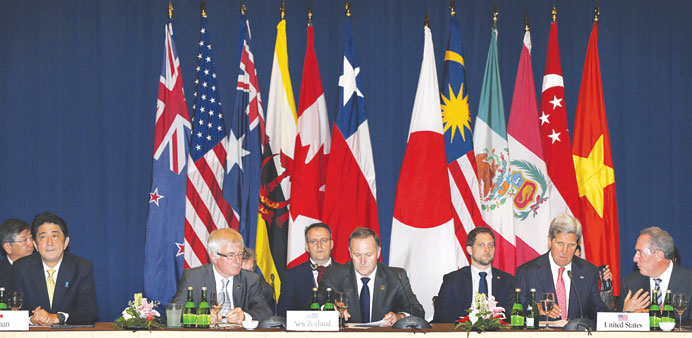Japanese Prime Minister Shinzo Abe, New Zealand’s Minister of Trade Tim Groser and Prime Minister John Key, US Secretary of State John Kerry and Froman are seen (from left) at the start of the TPP summit on the sidelines of the Apec Summit in Nusa Dua, Bali, Indonesia, yesterday.
A major goal of the Obama administration, deal will tear down trade barriers in areas such as government procurement and set standards for workers’ rights, environmental protection and intellectual property rights
The US maintained it hopes to seal an ambitious trade pact on schedule by year-end despite resistance in some countries and the absence of President Barack Obama from a regional summit that was to iron out differences on the pact.
US Trade Representative Michael Froman said yesterday that world trade ministers may discuss the US-proposed Trans-Pacific Partnership (TPP) on the sidelines of a World Trade Organisation meeting that starts on December 3, with a goal of reaching a deal by year-end.
But several outstanding issues remain, he told reporters at the Asia-Pacific Economic Co-operation (Apec) summit on the Indonesian island of Bali, citing issues ranging from intellectual property to state-owned enterprises, labour and the environment. The World Trade meeting will also be held on Bali.
Although many Apec leaders have already left Bali, trade ministers are still in talks over TPP and a joint statement is expected to be issued later.
“I think there is a consensus that there has been substantial progress on outstanding issues and there are still remaining issues that must be addressed,” Froman told reporters.
The three-year-old TPP talks, now involving 12 nations, are aimed at establishing a free-trade bloc that would stretch from Vietnam to Chile to Japan, encompassing 800mn people, about a third of world trade and nearly 40% of the global economy.
A major goal of the Obama administration, the TPP would tear down trade barriers in areas such as government procurement and set standards for workers’ rights, environmental protection and intellectual property rights.
Obama had hoped to settle the outstanding issues in discussions with other leaders at the Apec meeting but was forced to cancel his visit because of the fiscal standoff and partial government shutdown in Washington.
“We didn’t expect any real breakthrough on TPP in the meeting, especially with Obama not here. There is some progress though,” said a delegate from an East Asian country, who wished not to be named because he was not authorised to speak to the media.
The TPP, by seeking unprecedented access to domestic markets, is proving highly sensitive in developing countries such as Malaysia and Vietnam, whose political systems could be shaken by intrusions in areas such as government procurement and state-owned enterprises.
Proponents call the TPP, the most ambitious trade pact since the demise of the Doha round of global talks, a “high-standard” agreement to eliminate tariffs and tackle an unprecedented range of non-tariff barriers that restrict growth.
Obama has touted the deal by saying that 5,000 US jobs are created for each extra $1bn in exports created under the pact.
For the US, the TPP would complement its shift of diplomatic and military resources to Asia to tap the region’s fast growth and balance the growing influence of China, which has not joined the pact.
To its opponents, including a range of advocacy groups globally, the TPP represents an encroachment of US economic might that gives big corporations unprecedented powers to challenge national policies in the name of free trade.
US multinationals like Wal-Mart and Fedex have warned Washington not to compromise and weaken the trade pact in order to complete the deal by the end of this year.
“For Wal-Mart, we would like to see a high-quality agreement, which is that no sectors and no products are excluded. That there are no compromises that leak into the process for the purpose of speed,” Scott Price, chief executive of the US retailer in Asia, told Reuters.
More intrusive than other trade pacts, the TPP seeks to regulate sensitive areas such as government procurement, intellectual property and the role of state-owned enterprises as well as giving corporations more rights to sue governments.
In TPP nations such as Malaysia, Japan, and Vietnam, reform-minded leaders are seen as using the pact as external leverage to break down vested interests and force liberalisation of protected, inefficient sectors.
The Singapore Straits Times newspaper said a draft statement to be released on Tuesday shows that leaders will likely report that TPP talks are not “substantively finished”.
Negotiators hope to revive global trade, which has weakened due to an economic slowdown in China and emerging markets like India and Indonesia.
The 21 countries of Apec closed out the summit by agreeing to implement responsible macroeconomic policies that will help offset the slowdown.
“Global growth is too weak, risks remain tilted to the downside, global trade is weakening and the economic outlook suggests growth is likely to be slower and less balanced than desired,” the group said in a prepared statement.
“We will implement prudent and responsible macroeconomic policies to ensure mutually reinforcing effect of growth and to maintain economic and financial stability in the region, and prevent negative spillover effect.”

